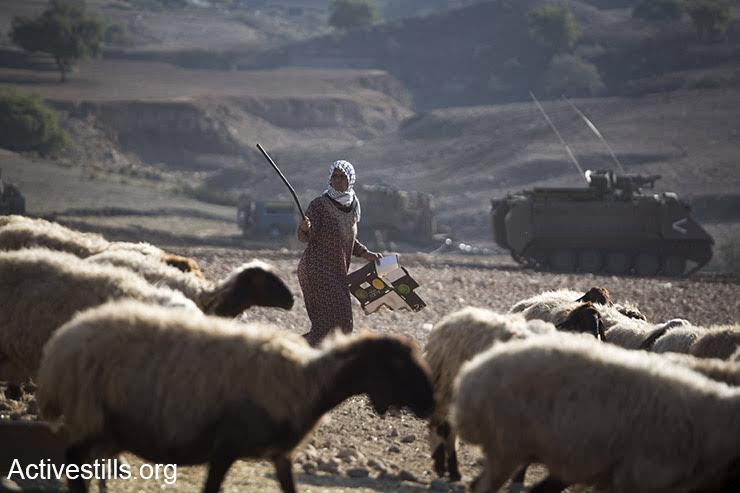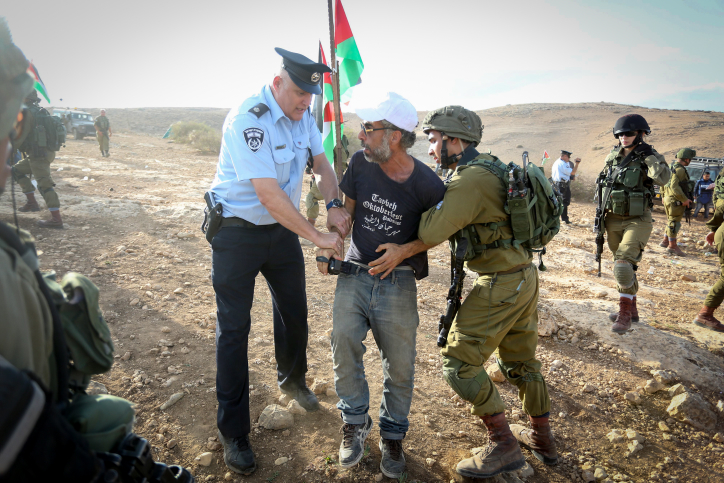It can be hard to imagine how an early morning walk can end in arrest, or worse. In the Jordan Valley, that’s the reality for Palestinian shepherds fighting to keep control of their land.
By A. Daniel Roth

Driving northeast from Jerusalem into the occupied West Bank, the sun is making its quick ascent in pinks and oranges over the hills to our right. In the early morning light I notice flocks of sheep on either side of us. Their beige wool coats bleed into the hay and rock. For a few minutes on the quiet 6 a.m. drive into the Jordan Valley, I enjoy the cool air and morning radio, wondering what to expect in the hours ahead.
Since Israel began occupying the West Bank over 52 years ago, the Jordan Valley, which makes up about 30 percent of the entire West Bank along the border with Jordan, has been seen as a strategic asset by Israeli governments from across the political spectrum. For years Israeli Prime Minister Benjamin Netanyahu has said that Israel will not give up control of the area, and at this point, the Jordan Valley has been normalized in the public discourse as just another part of Israel. In reality, however, the tens of thousands of Palestinians who live there are under military rule.
Meanwhile, the area has seen a growing number of settler outposts, and in turn, the land that Palestinians can move, work, and live on is continuously shrinking. This shifting reality is primarily enforced through daily intimidation by settlers and soldiers in the area — as well as uncertainty about access to their homes — on any given day. It’s a persistent part of Palestinian life there and the main reason we are there: to stand alongside Palestinian shepherds and farmers and face that very intimidation with them.
No matter how often I join the near daily team of activists accompanying Palestinians here, I never quite recognize where it is that the car stops for us to meet the shepherds with their flocks. Each morning it takes me time to regain a sense of direction between the hills, villages, outposts and dirt roads.

On this particular morning the three of us are accompanying two flocks and three Palestinian shepherds, not far from the roadside village of Auja, just outside Jericho. The mission, as usual, is to walk with them in order to try to deter the ongoing harassment and violence from settlers and soldiers, who try to push Palestinian shepherds off this grazing land.
No more than 20 minutes into the slow walk, the calm, quiet morning is broken by an Israeli army jeep kicking up dust in the distance. It’s on its way to us. The shepherds, a young woman and child with one flock and another young man with the other, move away to the other side of the hill in two different spots. My heart sinks as the jeep stops and three soldiers get out and start toward one of the shepherds.
We hurry toward them, our central roles are to act as a buffer and document everything with our phones. As I catch up to the fray I hear the tail end of one of the soldiers explaining that this land belongs to Omer, a settler in the area. There is no cover story this morning; everyone is on the same page about who is giving the marching orders around here. Israeli settlers took this land in the occupied Jordan Valley from Palestinians and the Israeli army is here to protect that claim.
Here in the Jordan Valley, as in much of the occupied territories, settlers call the army to protect the land they have taken from Palestinians and everybody knows it. Why? Because the policy on the ground is to make life so uncomfortable, so hard, and so dangerous that Palestinians will leave — part of the ongoing policy of creeping annexation in Area C of the West Bank.

Slowly but surely the armed soldiers walk the entire flock back with threats of arrest, a heavy price particularly for Palestinians who live under occupation. The military rules their lives and they don’t have many of the rights and freedoms that those under democratic rule take for granted. The soldiers laugh, sometimes they yell, but they know their mission is to push the Palestinians back in order to make room for the settlers, and they are constantly pushing until they feel it is far enough.
If you haven’t witnessed it, it can be hard to imagine what it looks like when an early morning spent walking with their flock can end in arrest or worse — simply because one is Palestinian. Yet it’s important to try to imagine it. For those of us who are not Palestinians living under occupation, it may be impossible to really internalize the fear and uncertainty that each morning can bring.
As we drive back toward Jerusalem we pass stone walls and concrete homes, beige and yellow hills, and grey army pill box towers that cut up the blue sky. I think about what took place, all before 8:30 a.m. I think about the fact that the flocks ate, though not enough, and though we were harassed by armed soldiers throughout, these Palestinian shepherds were present on their land for another day.
Daniel Roth is an educator and journalist based in Jerusalem. His writing and photography is at allthesedays.org. Follow him on Twitter: @adanielroth.
